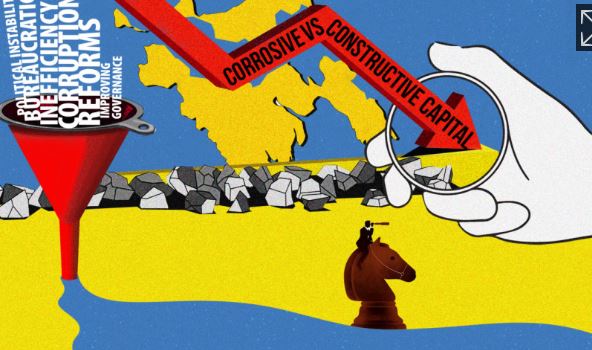We Must Distinguish Between Corrosive and Constructive Capital
Zillur Rahman | 13 November 2025
Money moves more quickly than ever in the modern world. However, not all money is what it seems or claims to be. While some subtly advance hidden interests and undermine accountability, others create opportunity, institutions, and trust. This subject dominated the conversation at a conference hosted by the Center for International Private Enterprise (CIPE) in Washington, DC, earlier in September. Activists and experts from several continents discussed how foreign investment may either aid or undermine democracy. The distinction between constructive and corrosive capital, as defined by CIPE, was the concept that stuck with me.
Where money is utilised for power instead of collaboration, that is where corrosive capital originates. Typically, it is politically motivated, opaque, and intended more to purchase influence. Its attraction is straightforward: quick loans, simple terms, and no embarrassing inquiries about questionable environmental standards, governance, or transparency. However, these agreements frequently have unstated conditions that tighten over time. Conversely, openness, justice, and accountability are valued by constructive capital. Its investments extend beyond bricks and mortar to encompass institutions, markets, and people.
Over the past decade or so, we have witnessed the transformation of corrosive capital into a geopolitical weapon. In some regions, such as Asia, large-scale infrastructure investments have sometimes taken on this character—projects involving highways, power plants, bridges, and ports that appear to foster development on paper. In reality, many of these ventures are negotiated behind closed doors, with inflated costs and limited public oversight. China's Belt and Road Initiative (BRI) could be cited as an example in some cases, but capital injection by many international financial institutions sometimes had similar impacts in developing countries. The debt distress or repayment issues faced by Sri Lanka and Pakistan, for example, show how "infrastructure diplomacy" can at times be used as a tool of leverage. Yes, money creates something tangible, but it also creates influence that can far outlast the loans themselves.
Unquestionably, infrastructure is essential. No country can advance without energy, roads, and railways. To sustain growth, the Asian Development Bank has projected that this region alone will require more than $8 trillion in infrastructure investment. Therefore, the question is not whether to invest, but rather what kind of investment to make. Constructive capital, more likely to originate from democratic countries or international organisations, may require more time and effort, but it yields long-term benefits. Corrosive capital prefers shortcuts—easy approvals, no audits, and no public accountability.
Bangladesh is at a turning point in this discussion right now. We have a huge infrastructure demand as we prepare to leave the bracket of the least developed countries (LDCs); power plants, ports, highways, and bridges are changing the national outlook. However, vulnerability also comes with progress. The issue is not how many projects we can unveil, but whether we are selecting partners who will make our institutions stronger or weaker.
Although some Asian and Western countries have become increasingly visible development partners for Bangladesh, each brings its own philosophy and approach to engagement. Japan's model of development cooperation, for instance, is sometimes cited for its emphasis on long-term planning, institutional capacity-building, and technology transfer. What matters most, therefore, is not the origin of capital but the values embedded in its delivery—whether it nurtures autonomy and accountability or breeds dependence and opacity.
Experiences from around the world further underline this. Some long-term infrastructure or energy projects in countries such as Egypt, Hungary, and Turkey show how external financing generates both opportunities and vulnerabilities. Bangladesh's own Rooppur Nuclear Power Plant similarly offers a mix of benefits and constraints: it promises stable electricity generation but also binds us to Russian technology, know-how, and maintenance for decades. Such examples remind us that investment is rarely solely about economics; it carries strategic, technological, and political implications. The challenge for any developing country, therefore, lies in balancing immediate development needs with long-term sovereignty and policy flexibility.
But where transparency is treated as optional and governance remains weak, corrosive capital finds fertile ground. It empowers those who thrive in opacity, rewards loyalty over merit, and often sustains networks of patronage rather than systems of accountability. This was one of the strongest takeaways from the CIPE conference: when funds move without scrutiny, democracy is quietly undermined.
Journalists, think tanks, and civil society organisations are calling for more transparent contracting, public disclosure of foreign loans, and stronger parliamentary oversight, not just in Bangladesh, but across Asia. These are not anti-investment measures but pro-accountability safeguards. They help ensure that capital, regardless of its source, primarily serves national priorities rather than narrow or external interests. In environments where the norms are clear and institutions trusted, constructive capital can flourish. Investors and citizens, too, find greater predictability when rules are properly enforced.
So for Bangladesh, this is not a binary choice between this camp and that camp, or between one financing model and another. It is a question of principle: whether the country will embrace constructive capital that strengthens governance, or corrosive capital that erodes it. As Bangladesh advances towards a post-LDC reality, good governance, competitive bidding, and transparency must become non-negotiable. Every major investment, foreign or domestic, should be evaluated for its fairness, sustainability, and respect for national sovereignty.
Ultimately, a nation's strength is measured not by the projects it inaugurates but by the people it empowers. Constructive capital invests in human potential—the workers, entrepreneurs, and thinkers who build the country's future. Corrosive capital, by contrast, traps them in systems designed to benefit others. Bangladesh must internalise this lesson and act accordingly. The durability of our economic sovereignty will depend on how well we do that.
Zillur Rahman is host of the current affairs talk show Tritiyo Matra. He also serves as president of the Centre for Governance Studies. His X handle is @zillur.
This article was originally published on The Daily Star.
Views in this article are author’s own and do not necessarily reflect CGS policy.
